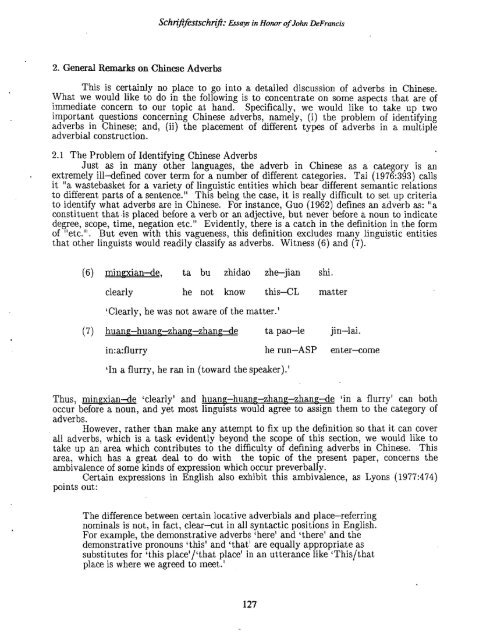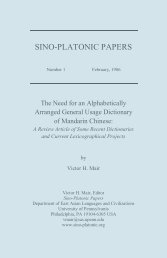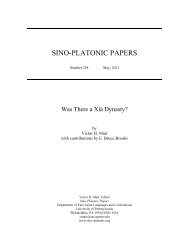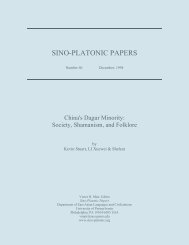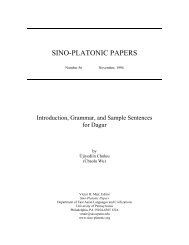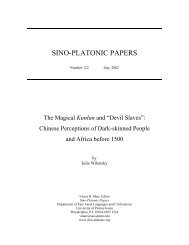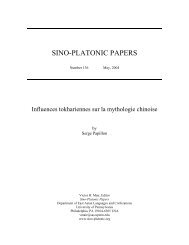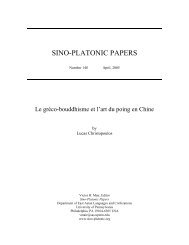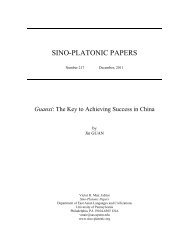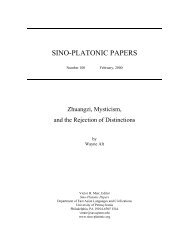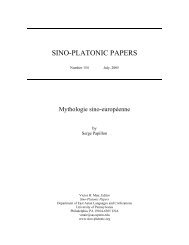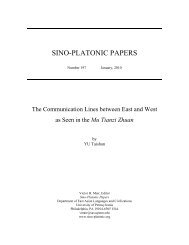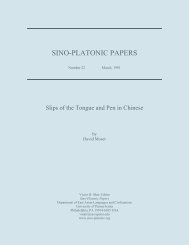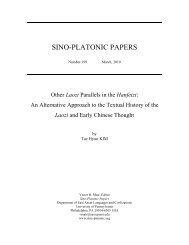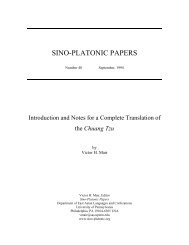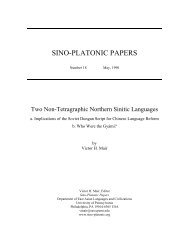Essays on Writing and Language in Honor - Sino-Platonic Papers
Essays on Writing and Language in Honor - Sino-Platonic Papers
Essays on Writing and Language in Honor - Sino-Platonic Papers
You also want an ePaper? Increase the reach of your titles
YUMPU automatically turns print PDFs into web optimized ePapers that Google loves.
2. General Remarks <strong>on</strong> Ch<strong>in</strong>ese Adverbs<br />
Schniftfes~schn~: fisaqs <strong>in</strong> H<strong>on</strong>or of John &Francis<br />
This is certa<strong>in</strong>ly no place to go <strong>in</strong>to a detailed discussi<strong>on</strong> of adverbs <strong>in</strong> Ch<strong>in</strong>ese.<br />
What we would like to do <strong>in</strong> the follow<strong>in</strong>g is to c<strong>on</strong>centrate <strong>on</strong> some aspects that are of<br />
immediate c<strong>on</strong>cern to our topic at h<strong>and</strong>. Specifically, we would like to take up two<br />
import ant questi<strong>on</strong>s c<strong>on</strong>cern<strong>in</strong>g Ch<strong>in</strong>ese adverbs, namely, (i) the problem of identify<strong>in</strong>g<br />
adverbs <strong>in</strong> Ch<strong>in</strong>ese; <strong>and</strong>, (ii) the placement of different types of adverbs <strong>in</strong> a multiple<br />
adverbial c<strong>on</strong>structi<strong>on</strong>.<br />
2.1 The Problem of Identify<strong>in</strong>g Ch<strong>in</strong>ese Adverbs<br />
Just as <strong>in</strong> many other languages, the adverb <strong>in</strong> Ch<strong>in</strong>ese as a category is an<br />
. extremely ill-def<strong>in</strong>ed cover term for a number of different categories. Tai (1976:393) calls<br />
it "a wastebasket for a variety of l<strong>in</strong>guistic entities which bear different semantic relati<strong>on</strong>s<br />
to different parts of a sentence." This be<strong>in</strong>g the case, it is really difficult to set up criteria<br />
to identify what adverbs are <strong>in</strong> Ch<strong>in</strong>ese. For <strong>in</strong>stance, Guo (1962) def<strong>in</strong>es an adverb as: "a<br />
c<strong>on</strong>stituent that is placed before a verb or an adjective, but never before a noun to <strong>in</strong>dicate<br />
degree, scope, time, negati<strong>on</strong> etc." Evidently, there is a catch <strong>in</strong> the def<strong>in</strong>iti<strong>on</strong> <strong>in</strong> the form<br />
of "etc.". But even with this vagueness, this def<strong>in</strong>iti<strong>on</strong> excludes many l<strong>in</strong>guistic entities<br />
that other l<strong>in</strong>guists would readily classify as adverbs. Witness (6) <strong>and</strong> (7).<br />
(6) m<strong>in</strong>exian-de, ta bu zhidao zhe-jian shi.<br />
clearly he not know this-CL matter<br />
'Clearly, he was not aware of the matter.'<br />
(7) huaner-huan~-zhan~-zhan~ae ta pale j<strong>in</strong>-lai.<br />
<strong>in</strong>:a:flurry he run-ASP enter-come<br />
'In a flurry, he ran <strong>in</strong> (toward the speaker).'<br />
Thus, m<strong>in</strong>gxian-de 'clearly' <strong>and</strong> huanrr-huang-hane-zhang-de '<strong>in</strong> a flurry' can both<br />
occur before a noun, <strong>and</strong> yet most l<strong>in</strong>guists would agree to assign them to the category of<br />
adverbs.<br />
However, rather than make any attempt to fix up the def<strong>in</strong>iti<strong>on</strong> so that it can cover<br />
all adverbs, which is a task evidently bey<strong>on</strong>d the scope of this secti<strong>on</strong>, we would like to<br />
take up an area which c<strong>on</strong>tributes to the difficulty of def<strong>in</strong><strong>in</strong>g adverbs <strong>in</strong> Ch<strong>in</strong>ese. This<br />
area, which has a great deal to do with the topic of the present paper, c<strong>on</strong>cerns the<br />
ambivalence of some k<strong>in</strong>ds of expressi<strong>on</strong> which occur preverbally.<br />
Certa<strong>in</strong> expressi<strong>on</strong>s <strong>in</strong> English also exhibit this ambivalence, as Ly<strong>on</strong>s (1977:474)<br />
po<strong>in</strong>ts out:<br />
The difference bet ween certa<strong>in</strong> locative adverbials <strong>and</strong> place-referr<strong>in</strong>g<br />
nom<strong>in</strong>als is not, <strong>in</strong> fact, clear-cut <strong>in</strong> all syntactic positi<strong>on</strong>s <strong>in</strong> English.<br />
For example, the dem<strong>on</strong>strative adverbs 'here' <strong>and</strong> 'there' <strong>and</strong> the<br />
dem<strong>on</strong>strative pr<strong>on</strong>ouns 'this' <strong>and</strong> 'that' are equally appropriate as<br />
substitutes for 'this placeV/'that place' <strong>in</strong> an utterance like (This/that<br />
place is where we agreed to meet.'


